‘Everything Everywhere All At Once’ Directors Daniel Scheinert & Dan Kwan: “Putting My Mom In ‘The Matrix’ Was A Very Funny Concept”
- Oops!Something went wrong.Please try again later.
- Oops!Something went wrong.Please try again later.
- Oops!Something went wrong.Please try again later.
- Oops!Something went wrong.Please try again later.
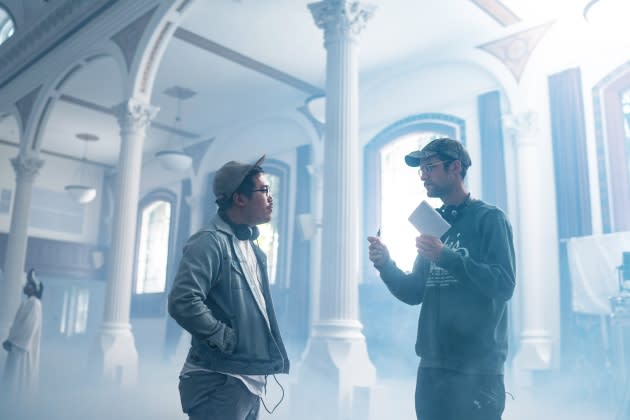
Following Swiss Army Man, in which Daniel Radcliffe played a flatulent corpse, was always going to be hard for the Daniels, AKA Daniel Scheinert and Dan Kwan. But not only did they do it, with a crazy fantasy about a Chinese American mom — a never-better Michelle Yeoh — who unlocks the secrets of the universe, they’re also looking at serious awards season buzz for their direction, screenplay and cast. The directors are obviously flattered, but they have a favor to ask. “You’re not allowed to root for our film unless you go see all the other ones,” Scheinert says. “Particularly in a theater. They’re so good and so much fun in a theater.”
DEADLINE: Cast your mind back to when the film premiered at SXSW in March. Were you nervous or did you know what you had?
More from Deadline
'Fabelmans', 'Everything Everywhere' & 'Woman King' Lead AARP Movies For Grownups Nominations
'Everything Everywhere', 'Fabelmans', 'Babylon' Lead Critics Choice Award Nominees For Film
DANIEL SCHEINERT: I think we knew. We were less nervous than Swiss Army Man because we had a distributor [A24], we knew that the movie had crowd-pleasing qualities, and that SXSW is a very friendly place where we’ve screened a lot of our very weird movies over the years. So, we were like, OK, this audience will be friendlier than some festivals to the weirdness. But the reception still humbled us and freaked us out. And it was the first time we got a taste of just how much people resonated with the emotional side of the movie, not just the action.
DEADLINE: It’s a film about levels, but it also works on many levels: there’s obviously a level of spectacle, but there are also levels of emotion and even philosophy, which is the most surprising element. How did you approach such a big story?
DAN KWAN: We’ve been directing together for 10 years and we’ve slowly learned that we love to balance all those things. I don’t think we’d be happy if we only made a fun action movie, and I don’t think we’d be happy if we only made a philosophical treatise. And so every time we come up with an idea, we always, in the back of our minds, know we have to pair it with these other things so that we get this beautiful constellation effect.
So usually what happens is that the first idea is just the dumb idea. What’s the silly, fun, stupid thing that makes us laugh? But we only pitch those things just to get a kick out of it. And then later down the line, if we’re thinking about it still months or years later, it starts to attach itself to meaningful stories of our own, or philosophical ideas or things that feel therapeutic. Once those things start to latch on, it starts to form into something a little bit more exciting. And so it’s a very organic process. We never know where our ideas start and when they end, really. It’s about the accumulation, that snowball effect that a single idea can have sometimes. And in this case, it was very much just the dumb fun action movie idea of being able to connect with other versions of yourself in other universes, and then it slowly snowballed into something that was way more comprehensive and personal.
.
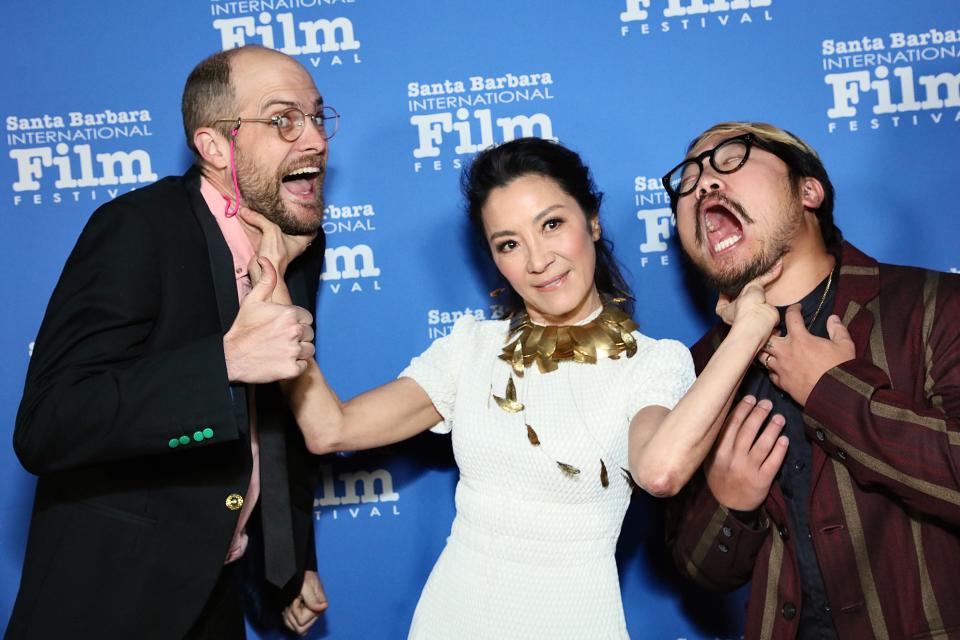
DEADLINE: To follow on from that, how does it work? Is this idea that you could have had independently of each other, or is this very much a product of the Daniels?
SCHEINERT: Totally. We always say we would make completely different movies if we were by ourselves, but in this case, it started with a silly idea Dan had and then he pitched it to me. I don’t like science fiction if it doesn’t acknowledge the philosophical repercussions of its premise — if it just brushes over that and it’s just fun — so I pushed back, and we stumbled into the bleak, meaningless direction the story might go. I don’t know which of us wanted it to be Chinese American first, but I do think that our internal conversations had made us hungry to explore that because our longtime producer is Chinese American, and Dan is. So, it’s definitely through conversation that the idea took shape. We’re always stress-testing each other’s ideas, being each other’s first sounding board.
KWAN: People talk about marriages, and how you start out with two individuals with very separate minds and the longer they live together they can actually start to … Scientists have done studies where they actually see this communal brain trust thing happening within the marriage, where the people can complete each other’s sentences, where they understand the other people’s needs before their own. So it becomes this very organic thing. And I think because we’ve been working together for so long, our ideas are very uniquely birthed from the fact that our brains have become a single entity, creatively, which is interesting and very scary at the same time.
SCHEINERT: And also, like a marriage, you can become co-dependent. Suddenly he’s been balancing the checkbook for 10 years and I’m incapable of it. And he doesn’t know how to drive a car, because I’m the one who’s always driving.
DEADLINE: You said that when you premiered the film you already had a distributor. At what point did A24 come on board?
Scheinert: I want to say 2017 or 18. Long time ago. They actually expressed interest in it right out the gate after Swiss Army Man. We were taking meetings and talking about what our next project might be, and some of our friends there were like, “This sounds fun.” So when we started putting the money together, they were one of the first people we talked to.
DEADLINE: Did you have a finished script at that point then?
SCHEINERT: When we first pitched it, it was just a loose idea, and then we came back to them with a finished script and they were gung ho about it. And to their credit, a lot of the usual Hollywood ambiguity happened, where actors’ schedules were tough and people dropped in and out. But they really believed in the movie throughout all that. And from watching our filmmaker friends go through similar experiences, we’ve realized just how lucky we are that they believed in the idea, not just the package.
DEADLINE: How important was it to have a middle-aged woman as the center? Was that always the plan?
SCHEINERT: It was always our parents’ generation.
KWAN: Yeah. We always knew the film was going to be about generations, that gap that happens with every generation, because it felt like a really perfect way to explore the multiverse and the way that we were trying to use the multiverse as a proxy for the internet, and how it’s really divided us and our own parents. But then the fact that it was about a mother came later. As we were exploring draft after draft, we slowly realized how much easier it was for us to write to our mothers. We have very strong-willed, interesting mothers who have… left an impression on us. And so, writing to that just felt way more personal and way more interesting and something that we talk about a lot. It became a movie that we hadn’t seen before. Putting my mom in The Matrix was a very funny concept that, once we pitched it in those terms, we started to really get excited.
DEADLINE: Michelle seems so obvious now. But what was it about her that made her particularly unique for the role?
SCHEINERT: she was always the first choice. We both grew up adoring her movies, but also, as a filmmaker, if there’s an actor I love and the role I’m writing for them is something I haven’t seen them do a million times, I get extra excited. It’s a little risky, because she might have read it and been like, “I don’t respond to this.” But the opposite happened. She read it and she was so excited to do something new and different. But it was a 100% her all along and we were terrified of what would happen if she said no.
DEADLINE: There’s a lot of subtlety to that performance, not only in the fantasy worlds but in the real world, where she’s using an accent that isn’t her own. Did you just leave her to it or did you have to help her with that, maintaining that consistency?
KWAN: Our initial conversations were actually pretty loose at first and we found the character together over some time. Early on I sent a bunch of recordings of my mother to her, just as a fun thing, saying, “I don’t think you should copy her in any way, it’s just for you to understand what I’m going for.” And immediately Michelle was like, “I know exactly who in my life I’m going to model this character after.” And she told us who it was. I won’t go into too much detail, but she had a very specific friend of hers who came back and forth between China and America, and so her lifestyle was very similar to Evelyn’s. It’s interesting that you picked up on that, but it is subtly different from her actual voice, it’s one of those things that I think usually only Asians, or Chinese-speaking people would actually catch onto. So it’s very astute of you.
SCHEINERT: She doesn’t love rehearsing a ton. And so there was definitely, the first day of shooting was the first time we really saw her in character using that voice. And I think we both, at the monitor just got so excited because we were both like, “Wow, I totally buy it.” The international superstar Michelle has completely disappeared.
DEADLINE: Ke Huy Quan’s performance is equally layered. Why did you take a chance on him, and what was it that you saw in him?
KWAN: It’s so interesting. Maybe his short acting career doesn’t point to what he could do in this movie, but when you really dig into his life and what he’s accomplished, he actually becomes pretty obvious. Early on, we were trying to figure out who to cast for this role, and we were trying to find someone who could speak Cantonese, Mandarin and English, who could do kung fu and action choreography, and who also could just be convincingly, over-eagerly sincere and earnest in that way. Which is actually one of the hardest things for an actor to really capture, if that’s not how they are, because it can feel so saccharine and disingenuous. And so as we were looking, we came across a picture of Short Round from Indiana Jones and we immediately started wondering, “OK, what happened to this kid? What has his life become?”
And we started doing research and it turned out he was on multiple stunt teams. He was on Bryan Singer’s X-Men as part of the stunt team there. He had been working in Asia, in Taiwan and, more notably, in Hong Kong. He was Wong Kar-wai’s first AD. And so he had this really interesting career. He happened to be able to speak Mandarin and Cantonese. And on top of all that, you go back to the beginning of his career and you just see the most lovable sweet character. And we were just wondering: Does he still have that, and would he be willing to audition for our role? He was the first person we auditioned, actually, and he immediately won our hearts over. It was amazing actually, to meet him for the first time because he was so excited.
DEADLINE: It’s funny you mention Wong Kar-wai, because when Waymond is in the movie universe he looks like Tony Leung in In the Mood for Love. Am I right to see that?
SCHEINERT: Oh, 100%. We ended up using movie references a little bit begrudgingly, but it was such a useful shorthand, because we were really worried the audience would get too confused too soon. So it became really helpful. Like, we’re going to give [Movie Star Evelyn’s universe] a really distinct, memorable, nostalgic aesthetic, and the hope was that by leaning into Wong Kar-wai, you’d always know where you were. But it was very scary, especially once we realized that Wong Kar-wai is friends with Ke. We were like, “Oh my God, he’s definitely going to see this movie. He’s going to be so mad at us.”
KWAN: Yeah, it’s funny because he also worked with Tony Leung on 2046, so he actually knew the man himself. So the whole thing was very bizarre actually.
SCHEINERT: And sometimes he’d be like, “You guys remind me of Steven.” And we’d be like, “Who are you talking about?” And then we’d realize. His point of reference is Steven Spielberg, which is so terrifying. Very intimidating.
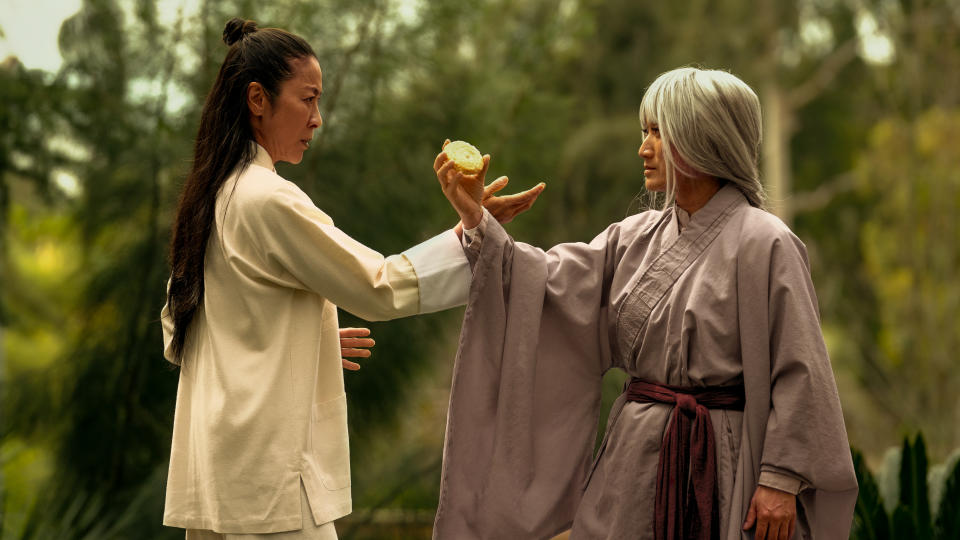
DEADLINE: Other than that, I didn’t find myself spotting too many references. Was it a conscious decision not to go down that route and make it too in-jokey?
KWAN: I think it comes down to intention, because I do think there are quite a lot of films and genres that get thrown into the blender of our film, but the intention isn’t for it to be in that classic pop-culture joke way, where you point to the thing and say, “Ha! Do you get it?”
The intention was very much just, like Scheinert said, to give the audience a really quick visual shorthand with the film so that they could, they basically can become literate in how the film works. But then the other thing that we think a lot about is the fact that in our lives, every one of us, we watch so many movies. The culture is very film literate, and so it just feels more accurate to actually have things that are echoing that collective dream space, if that makes sense. And so if you go too referential, it becomes cheap.
But, on the other hand, if there are no references, it doesn’t feel accurate to how we all look at the world and process the world. There’s these moments in our lives where we’re walking down the street and we see something that reminds us of Punch Drunk Love. Or we go to a funeral and we’re not just thinking about our own pasts, going to funerals, it’s mixed in with all the classic funeral scenes from our upbringing. To not have the references also feels false, so we found a way to hopefully balance that.
SCHEINERT: Every funeral I go to, the soundtrack of Garden State is running through my head.
KWAN: Oh no!
DEADLINE: The revelation of the film for me is Stephanie Hsu. What process did you go through with her? She’s doing an awful lot of work there.
SCHEINERT: We auditioned a lot of folks, and she was more unknown than some folks. And that’s one of the examples where A24 totally believed in us when we said, “This is the person.” But also I think her audition spoke for itself, because she just came in and made the character her own. And we were like, “Whoa, we never thought this character would be echoing Jim Carrey’s The Mask!” But that was the vibe we got from her audition.
But Stephanie also is a grounded, trained, dramatic actress, and she had no trouble just dropping into the really emotional places. We had already worked with her once, actually, but she had a lot to say about what the movie had to say. And it’s always so dreamy when you have a creative partner who’s going to do more than just read the lines. And so she very much ended up being a kind of collaborator on the film. She wanted to talk about the whole movie and all the characters, not just her scenes. And those conversations were just so fruitful because she is an Asian-American queer woman who grew up in Southern California where we were shooting the movie. So it was like, “Tell us, are we getting this right?”
DEADLINE: What did she audition with? Did you give her a specific scene?
KWAN: There were two scenes that we auditioned with. One was the parking lot scene at the very end, that dramatic climax, because we knew we needed whoever to play this character would have to be able to really help us ground that moment. And then the other scene was the hallway sequence where we first are introduced to her, where she becomes the Elvis and she becomes the luchador and all of that stuff. It’s the first time where the character of Evelyn that has to meet Jobu Tupaki, and we knew that was going to be an incredibly difficult scene because the script is so ridiculous and so wacky. But underneath it all, there’s this heart, or this pathos that showed a really wounded villain. Oh, yeah, the audition also included the bagel moment when she first talks about the bagel.
A lot of people tried to play it really straight, and Stephanie was one of the only people who could really manage to make it goofy and dramatic without it feeling like the two things were canceling each other out. It was really fun and scary, honestly. We said, “Please, just surprise us, don’t worry about getting it right. Just embody chaos and we’ll see what happens.” And she did such a good job of that.
SCHEINERT: There was actually a third scene she did as well, which was just an edited version of the very beginning of the film, when Joy first shows up. We were like, “OK, Stephanie’s a happy, bubbly person who just explodes off the screen. Can she do a grounded, simple, depressed, awkward character?” It was a very brief scene, but it was important too. And that was such a relief that she 100% could just drop into that and her usually bubbly, effervescent self could just disappear into melancholy.
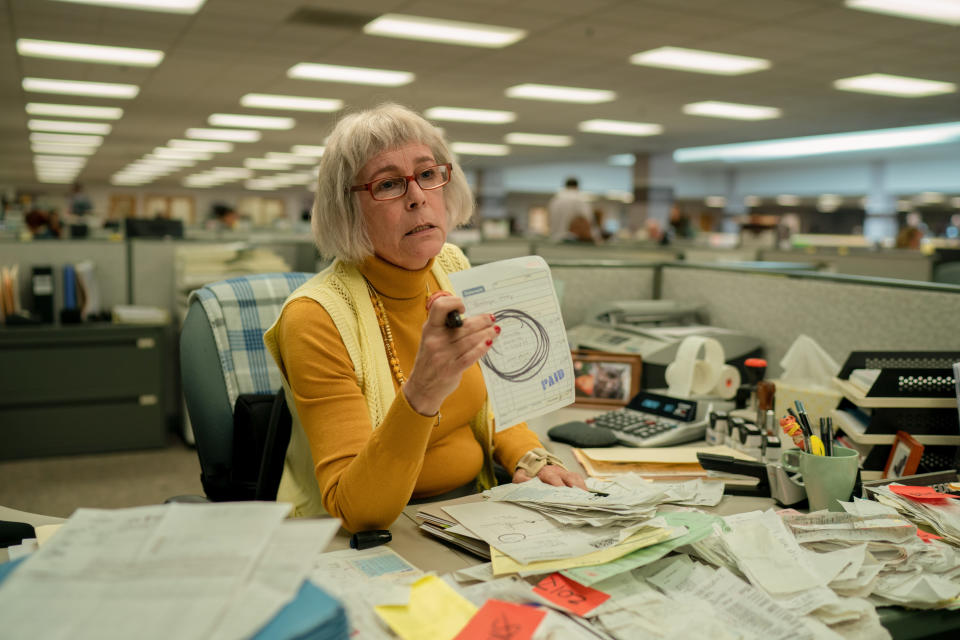
DEADLINE: Speaking of which, how did you come up with Jamie Lee Curtis’s dowdy look?
SCHEINERT: We had a bunch of pictures we had pulled out, and then our costume and hair departments had a bunch of ideas. It was very quick, the time between her coming on and then us starting to shoot. And so she just went through everything, and a big part of the pitch to her was that we wanted her to disappear into this character and really have fun with it. So There was one photo that she loved in particular, and we just ran with that. But a lot of it was Jamie. And I think one of the things she loved about the role was she loves to talk about how she knows women like this who are lonely and use their position of power to cope with that, to just put their thumb on folks. And so she instantly had very strong opinions about how this woman would talk and move and dress. And we loved every idea she pitched to us. So we were like, “Yes, whatever you want, Jamie.”
DEADLINE: Do you have a particular axe to grind with the IRS? It’s something that upsets a lot of people at this time of year.
SCHEINERT: We’re not good at taxes, and we know that there’s this prejudice against the IRS, so we really wanted to tap into that [laughs]. But we do not have an axe to grind with them. We think they need more financing. We think Americans need to pay their fair share of taxes. We think it’s a hard job. They’re just underfunded, and we’ve got to make our tax code go after the billionaires.
KWAN: We wanted the biggest challenge at the end of the film not to be a bad guy with a big weapon or something like that. The hardest challenge to us was an empathy challenge. And so we thought, ‘OK, who would it be hardest to empathize with? The awful, crotchety auditor.’ And so that felt like a really fun thing to play with.
DEADLINE: The action scenes are tremendous. What’s the secret to directing kung fu?
SCHEINERT: You have to just rip off Hong Kong movies and hire the right people. [Laughs] But from the very beginning it was something we were very excited to do. We’ve always loved that kind of cinema and there’s gotten to do little bits of it in our career.
KWAN: For both of us, how we look at filmmaking is, oddly enough, through an action-movie lens. That’s what I grew up on. My favorite movies, growing up, were the Hong Kong action movies and James Cameron’s action films. Terminator 2 was one of my favorite movies of all time when I was five years old. And so even when, before we started actively making this film, our whole career we’ve been shooting music videos kind of like they’re action films. If you go watch one of our commercials, they kind of feel like action films. Obviously, we surrounded ourselves with a lot of incredible talent to pull off our vision. But I also think that it’s just something that’s in our blood, because we grew up on this stuff and so it’s so exciting that we finally got a chance to do it. We got to work with people like The Martial Club who helped choreographed it for us, and Tim Eulich, our stunt coordinator, who’s been with us for many years now since we met him back in 2011. Just the fact that we finally get to pull it off and someone like you can watch it say “Wow, this is really impressive,” is very exciting. I hope we get to make more action films, honestly.
DEADLINE: There are so many universes, so many worlds. Were there any that didn’t make the cut?
SCHEINERT: There’s a lot that we wrote in the various drafts, and it took us a while to figure out, “What are the rules of what should stay and what should go in a movie that’s trying to go for too much?” And so, we whittled it down to universes that would definitely move Michelle’s character in a new direction. But there were two; there’s two that are on the Blu-ray that disappeared. One where Alpha Waymond is a pacifist and Michelle is a talking urn, and it was a universe where they talk about how this action movie was all for nothing and that war is not the answer. But the most heartbreaking one to cut, which was in every draft of the script, was a universe where you meet Spaghetti Baby Noodle Boy, which is a little talking macaroni and Michelle’s a talking spaghetti, and they talk about what it’s like to be in a world filled with pasta people. It was all puppets. We shot it, but in the test screenings, nobody responded to it.
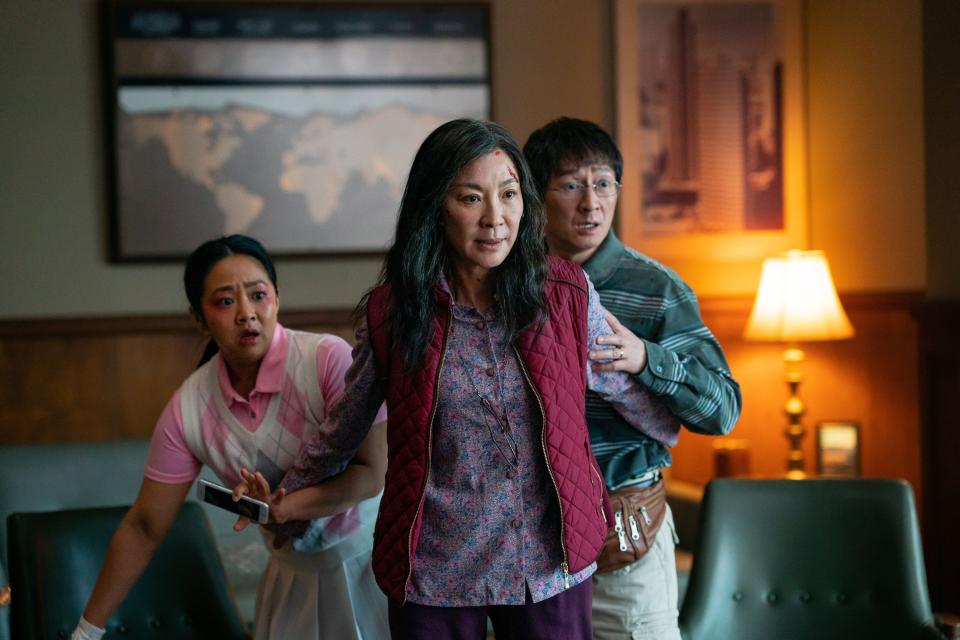
DEADLINE: Were there many test screenings?
SCHEINERT: A big part of our process was that we edited the movie for about a year and then every couple of weeks we’d show it to three or four people. So it wasn’t like we did big focus groups. Our process was just that we just wanted to talk to people who weren’t necessarily in the film industry and be like, “Are you understanding it? How confused did you get? Did the emotional scenes land?” Because, like I said earlier, the movie’s about getting confused. It’s supposed to confuse the audience, but it’s a really fine line between them getting exhausted and giving up or them relating to the protagonist and being like, “Oh, this is the point of it.” So every screening we got new feedback that would tell if we’d messed something up or the balance wasn’t working.
KWAN: Yeah, it’s an engineering problem. You just got to tweak things here and there. You never know the ripple effects. So I think it’s really important for a movie like this to have that kind of feedback and we welcome it.
DEADLINE: It’s is a very impressive structure, because it never wears out, or feels like a one-joke film.
KWAN: That was 90% of the work: Is this going to actually feel like a real movie by the end?
SCHEINERT: Yeah, and to be honest, we’d got the script to a place where we felt good — really good — about it. We felt like it was the best thing we had ever written, but almost nobody read it and said that. It was a pretty difficult script to read. But we knew we had this other thing in our back pocket, which is that we both started out editing all of our own stuff. And so we had a lot of editorial tricks up our sleeve. And so I think we knew we could do that process that I just described, that we’d get in the edit room and if people were confused, we’d throw every trick we have at it to try to keep the train on the tracks. And it took a while. Like I said, the script is very close to the final product, but it took a lot of tweaking to keep people on the tracks.
DEADLINE: When did you realize it was working?
KWAN: I feel like what has been really interesting about this film and working on it and releasing it is that every few months I’ll discover a new audience, if that makes sense. And so the first time where I felt like, “Oh, maybe this is going to work,” was actually our very first screening. It was almost three hours long and it was a mess still. But the structure was mostly there, it was mostly working. And at that initial screening, one of the test-audience people was someone we didn’t know. It was someone’s girlfriend who came along and she happened to be Asian-American, of our generation, and she was not part of the film industry. The first thing she asked was, “When are you guys going to do another one of these test screenings? I really want to show my mom this movie.”
And to me that was mind-blowing, because, normally, the first time we show anything to anyone it’s hard to know. There might be some promising things about it, but it’s kind of a mess, and you can’t really tell if it’s going to work. And so right off the bat, in our messiest version, there was at least one person who was like, “I want to show this to someone.” And then at every test screen, there’d be a surprising new person from a new perspective who would be like, “I see myself in this movie because of this reason.” Or “I see myself in this movie because of this other reason.” And so slowly, over the course of our edit, we started to feel this sense that this film was going to connect with certain people.
Another common thing we’d hear was audience members would watch the film at these test screenings and then they would say, “When are you going to release this movie? You have to release this movie next month!” Because we were in the middle of the pandemic at the time, and a lot of people were like, “This is what the world needs right now. We need a movie that acknowledges how chaotic and stressful the world is right now, but also manages to give some people some hope.” And so that really struck us as well.
It really is a testament to all the hard work that our cast and crew did that, even in the roughest version of it, people were reacting to the performances, to the craft, to everything. And we’re still finding new people, new audience members who are surprising us with what they see in the film and how they connect with the film.
DEADLINE: What did your mothers think of the film?
SCHEINERT: I still don’t really know what she thinks of the themes of it, but she laughed a lot at the accounting jokes, and she laughed a lot at the sex toys. I was like, “OK, I don’t fall that far from the tree. My mom is weird like me.”
KWAN: My mom is interesting because we’ve had a career of making things that push buttons. And so my mom has a very strange relationship with our work where something will come out and she’ll be like, “What is this? Why did you make that?” We did the video for Lil Jon, ‘Turn Down for What’, which is very aggressive and strange and sexual, and she was not into it at all. She’s seen our film three times. I don’t think she really understands it fully still, but she’s been to screenings, and she’s seen people react emotionally to the film in ways that I think she can appreciate.
DEADLINE: Do you always have ideas on the go or do you rest between each production?
SCHEINERT: No. We wish we had another script locked and loaded, because we’re in this position now where we could get something else made. And that’s a miracle as a filmmaker. But we have somewhere between one and 10 movie ideas, and they’re always moving around in rankings. Sometimes we get up in the morning, we’ll be trying to work on one screenplay and we accidentally end up working on a different one. And then we have some TV projects that we’ve been helping friends with for a long time that we’re going to try to find time to keep cracking on next year. It feels like we have too many. But that’s a good problem.
DEADLINE: What’s been your most abiding memory of 2022?
SCHEINERT: After screenings, I like talking to folks who just watched it. Sometimes I’m scared to do it because it can be so intense, because of the emotions that our movie pulls out in people, but I want to be present and a good listener and it’s so flattering that people want to come up and share their own stories. And so there’s been a lot of moments where someone comes up and cries, or makes us cry, right after we’ve done a Q&A. I’ve had some of the most meaningful conversations I’ve ever had in my artistic career because of people coming up to us afterwards and sharing their own family stories with us.
KWAN: There’s a couple of funny ones. Ari Aster came out to one of our Q&As because he’s a fan of the film. And afterwards we all hung out with my parents. So it was just me, my dad, my mom, Ari Aster, and some people from A24. It was the most ragtag group of people. And my dad and Ari Aster had a movie trivia competition, because my dad is a real movie nut. He knows a lot about films, and obviously so does Ari.
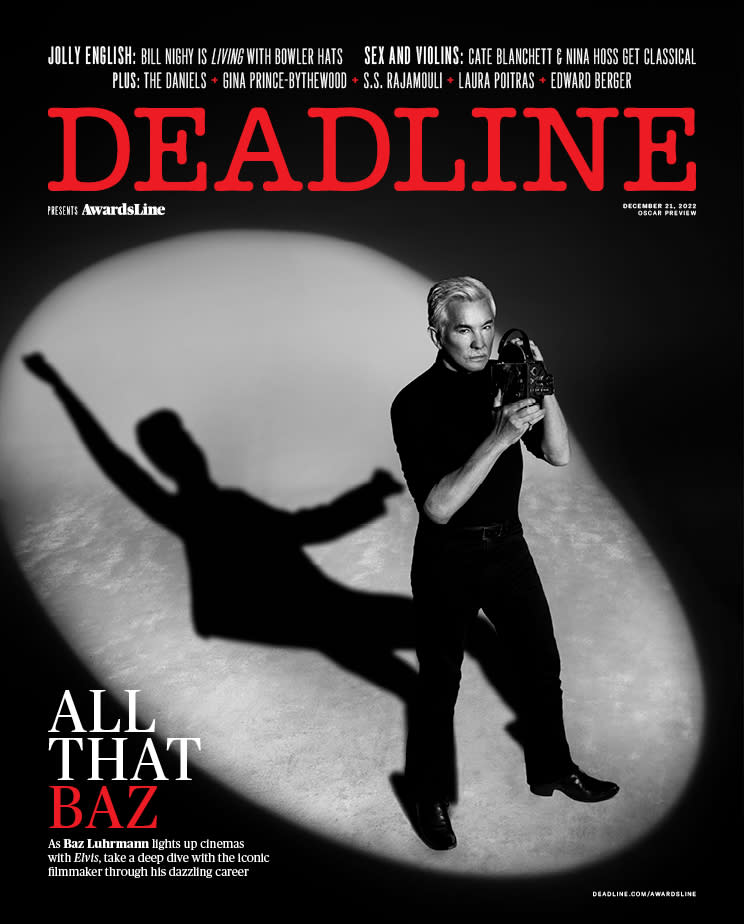
SCHEINERT: Wasn’t it about who could name the most movies with Jamie Lee Curtis in them?
KWAN: Exactly. So they kept going back and forth and actually my dad tied with Ari, which was a big deal. So that’s a funny memory. And then the night after our premiere at SXSW we had this incredible impromptu night of speeches, because Ke Huy Quan came in with a big bottle of sake and was like, “Everyone give a speech!” He poured everyone’s sake, and after every speech we all had to do a little shot of sake. And by the end of the night everyone was just a crying mess, because we all felt so delirious, and excited, and scared and hopeful. It was a very vulnerable, strange moment in our careers.
SCHEINERT: And then we had a dance party and I threw out my back. Lots of crying. It was very much like a wedding.
KWAN: That’s definitely going to go down in my memory bank as a very formative moment with our cast and our crew. It was great.
DEADLINE: Would you ever return to the multiverse or is that done now?
SCHEINERT: Technically, everything is part of the multiverse, right? It’s the biggest umbrella possible. But, no, I think we’re very excited by new challenges, so it’ll be a while before that feels like a new challenge. We do have one movie idea that is bigger and more ambitious and messier, and one movie idea that is focused and ambitious in the opposite direction, assuming we are capable of restraint. I think that’s a window into our brains. We’re always trying to go somewhere new, but we’re not sure which way we’ll go first.
Best of Deadline
2022-23 Awards Season Calendar - Dates For The Oscars, Golden Globes, Guilds & More
Red Sea International Film Festival 2022: Best Of The Red Carpet Gallery
Sign up for Deadline's Newsletter. For the latest news, follow us on Facebook, Twitter, and Instagram.

